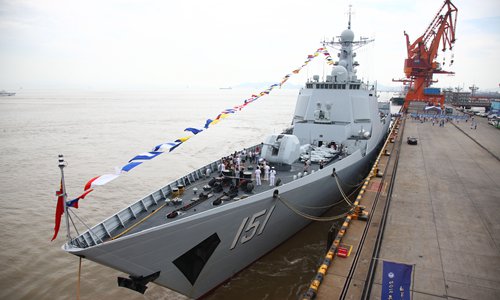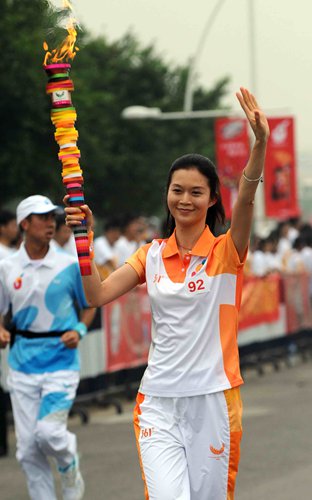
From the People's Daily app.
And this is Story in the Story.
The PLA Navy was founded on April 23, 1949.
The People's Liberation Army Navy has made tremendous strides over the past few years in transforming itself into a world-class force, according to top Navy commanders.
The PLA is the world's largest military force in the world.
The PLA is composed of five main service branches, consisting of the PLA Army, PLA Navy, PLA Air Force, Second Artillery Corps (strategic missile force), and the PLA Reserve Force. The PLA Rocket Force and the PLA Strategic Support Force were established in late 2015.
According to a national defense white paper entitled "China's Military Strategy," published in 2015, the PLA boasts 2 million soldiers, 800,000 reservists, and an Armed Police Force numbering 1.5 million.
Today’s Story in the Story looks at the first female PLA Naval commander for the destroyer Zhengzhou.

People visit the destroyer Zhengzhou in Ningbo, East China's Zhejiang Province, in 2016. (Photo: VCG)
During a combat drill in the East China Sea in March, Wei Huixiao sat in the command room on the missile destroyer Changchun and gave orders to soldiers to deal the finishing blow to the "enemy."
As the first female commander of the People's Liberation Army (PLA) Navy for the destroyer Zhengzhou, Wei drew public attention not only for her current title, but also for her journey from a doctorate student to the commander of a destroyer.
Wei was born into a Zhuang ethnic family in Baise, South China's Guangxi Zhuang Autonomous Region in 1977. After graduating from Nanjing University, she worked for Huawei in 2000 as a secretary to a senior vice president of the company.
Instead of continuing a career that brought her a yearly salary of roughly $150,000, she decided to get a doctorate degree from the Sun Yat-sen University in South China's Guangdong Province and applied to join the PLA.
A teacher who Wei met when she was a graduate student had dedicated his whole life to geological research, which did not bring fortune or fame, but was of service to the country. From this, Wei learned that "if something has to be done, but there is no one to do it, then I will do it."
But Wei has had to pay for some of her choices. Her father passed away when she was in Tibet, and she had no chance to say goodbye to him. Her mother passed away three days before the opening of the Beijing Olympic Games, and she had to return to Beijing after her funeral.
After getting her doctorate degree, Wei applied to join the PLA Navy. Her previous short experience in the army as a student had stoked her interest in a military career. Since the age limit for joining the army is 35 and Wei graduated at the age of 34, she started to speed up her application.
She sent recommendation letters to the relevant departments of the PLA, in which she presented her previous experience and potential to be a qualified soldier and expressed her eagerness to join the army.
After an assessment, Wei finally donned her uniform as a member of the PLA Navy in January 2012.

Wei Huixiao holds the torch for the 26th Summer Universiade in Shenzhen, South China's Guangdong Province, on May 15, 2011. (Photo: IC)
A good start does not mean everything goes as one wishes. Compared to her counterparts in the PLA Navy, Wei has much less knowledge of the army and military training.
She was once criticized for not standing properly during a flag-raising ceremony. Her previous knowledge did not include how to operate as a PLA Navy officer on a destroyer.
It usually takes a PLA officer 15 to 20 years to become a captain of a destroyer after graduating from an academy. Wei did not have that much time and had to make extra efforts.
When working on the Liaoning, Wei took every opportunity to become familiar with the equipment and all aspects of work on the aircraft carrier.
Wei performed excellently during her time at a PLA Navy academy in Dalian. To improve her swimming skills, she swam every morning when the destroyer reached the port.
Setting a goal to work for is a habit Wei has formed since childhood. "If you never discipline yourself or think about making sacrifices, you can never be a true soldier," she said.
Li Yigang, former captain of the Zhengzhou, said that Wei knew nothing about naval vessels when she first came to the Zhengzhou in 2015. But one year on, she can give commands with the notes she has taken and can arrange different jobs seamlessly.
Thanks to her persistent self-discipline, she got through all her assessments and became the first executive officer of the PLA Navy and was appointed trainee captain for the Zhengzhou in September 2017.
"If you want to believe in something and make it a purpose, you will finally achieve your goal by persistently working on it. When you do it, you will make more people believe that they can also do it," Wei said.
(Produced by Nancy Yan Xu, Lance Crayon, Brian Lowe and Paris Yelu Xu. Music by: bensound.com. Text from Global Times and China Daily.)


